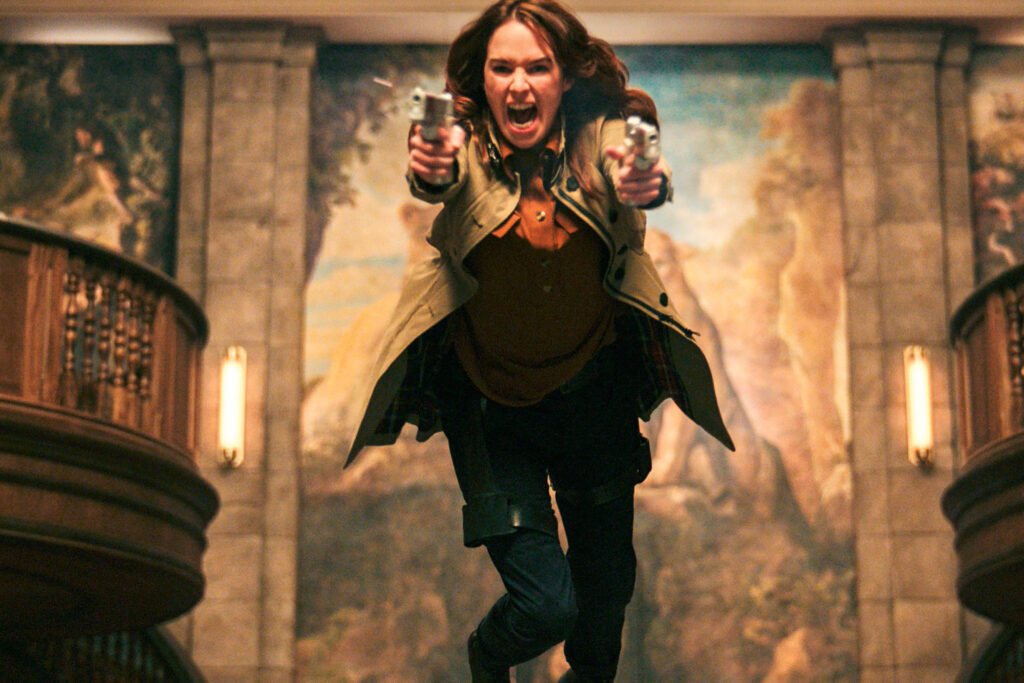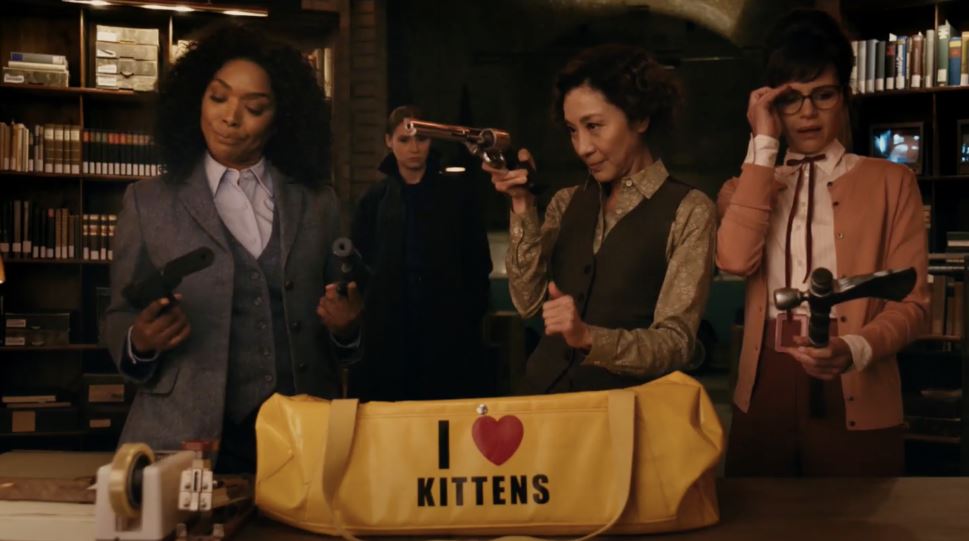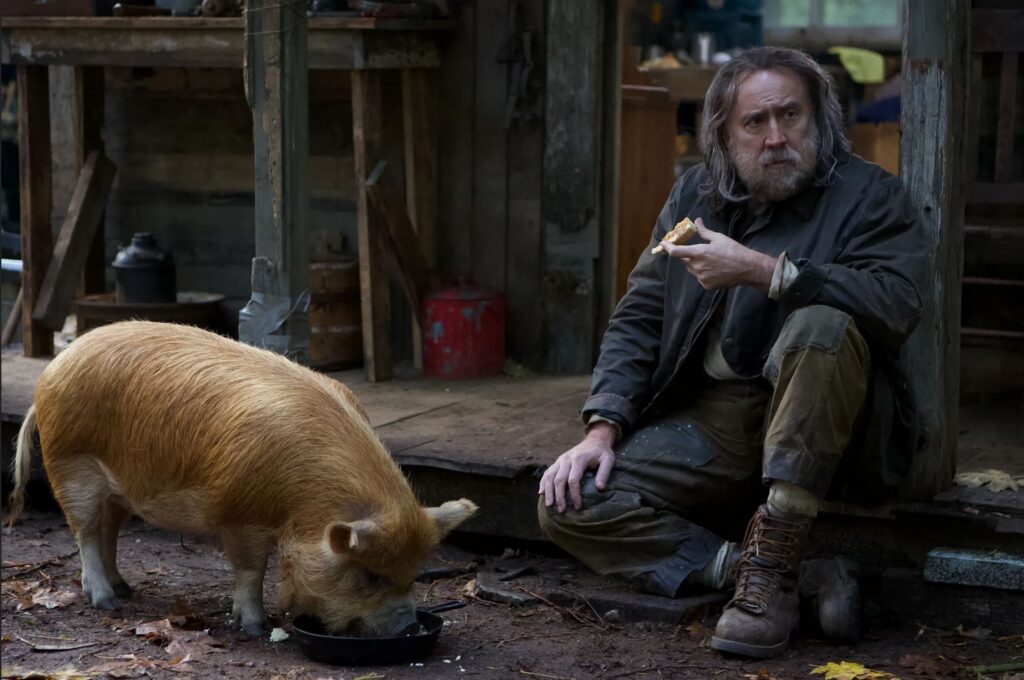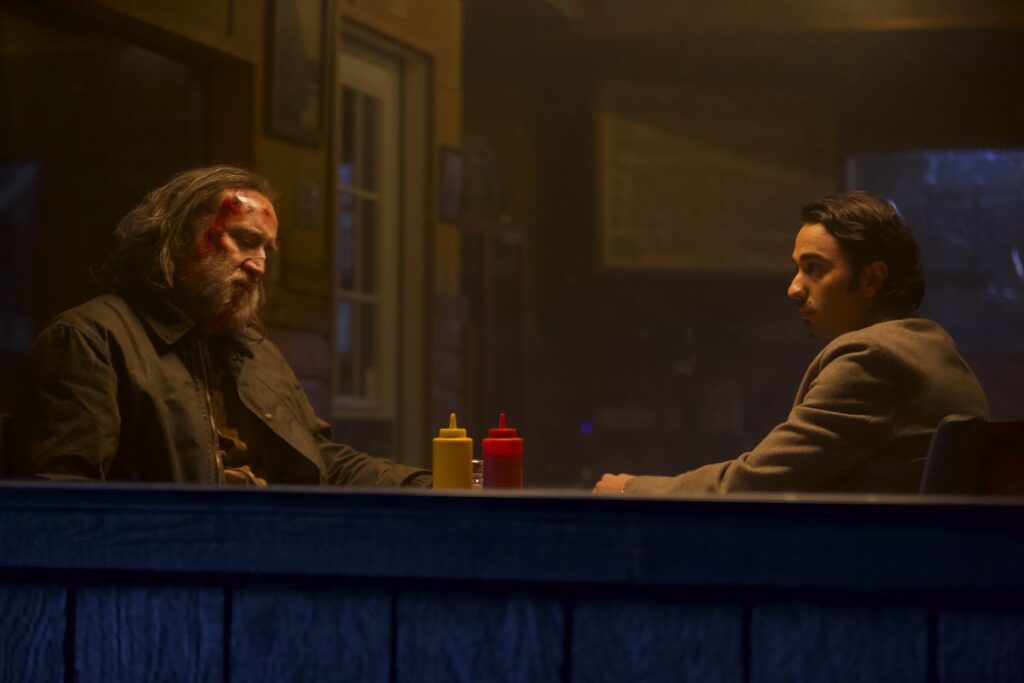
John Wick is technically an original character, but the films featuring him aren’t really anything new. They’re just slickly repackaged creations that combine the archetypes of the classic Western—the retired warrior begrudgingly forced back into battle—with the balletic flair of John Woo’s gun-fu pictures. Still, their mythology is so wonderfully detailed, and Keanu Reeves’ central performance is so intensely charismatic, that the franchise has quickly morphed from pastiche into primary source. Now, when a genre exercise like Nobody hits theaters, it’s instantly billed as “Bob Odenkirk doing John Wick”.
Last week alone saw the release of two new movies that wear their Wick influences loudly: Gunpowder Milkshake, featuring Karen Gillan as an assassin on the run, and Pig, starring Nicolas Cage as a hermit who’s drawn back into a dangerous underworld. Neither is nearly as good as the best Wick flick (that remains Chapter Two, though Parabellum certainly has its moments), but they’re nonetheless interesting for how they both pay tribute to and differentiate themselves from the film that has suddenly become the standard-bearer for revenge cinema.

Of the two, Gunpowder Milkshake is easily the more conventional, which seems like an odd thing to say about a movie that features machine-gun-wielding librarians. Yet straight from its neon-soaked opening logos, Navot Papushado’s actioner moves with a blunt-force obviousness that’s exceedingly, pleasingly familiar. Stop me if you’ve heard this before: A naïve, ruthlessly efficient killer works for a shadowy syndicate that shelters them from its darkest secrets. Before long, our coolly competent hero will question their loyalty to their employer, which will swiftly change their status from prize pig (whoops) to top-priority target. Over the next 100 or so minutes, blood will spill, body counts will rise, new alliances will be forged, fraught truths will be uncovered, and sovereignty will be hard-earned.
So, yeah: not exactly original stuff. Papushado and his co-writer, Ehud Lavski, attempt to mimic the Wickverse and create an urban folklore that teems with stylized absurdity, but they lack either the imagination or the resources to follow through. That the illicit consortium at issue is simply named The Firm is meant to imply rampant criminality cloaked in corporate respectability, but despite the presence of Paul Giamatti (who doesn’t exactly put forth his most strenuous effort), this performative underplaying is too banal to become sinister. The only memorable gesture is the repeated appearance of hollowed-out books containing weapons; beyond that, the glib universe manufactured here has no real character.

The characters don’t have much character either. Sam (Karen Gillan), our unsmiling hit woman, is haunted by the long-ago disappearance of her mother, Scarlet (Lena Headey). She kills people because it’s all she knows how to do, but Papushado’s surface-first approach pushes any existential burden she carries to the background. Instead, Sam becomes something of a surrogate mother herself when a wayward assignment (is there any other kind?) places her in the path of Emily (Chloe Coleman), an eight-year-old girl (“eight and three quarters!”) whose father ends up on the business end of Sam’s pistol. What follows is, like everything else, predictable: Sam must protect Emily while fending off waves of bloodthirsty goons sent after her by The Firm, and maybe deal with some mommy issues in the process.
The logline of “John Wick, but with women” isn’t unpromising, and while Gillan’s performance doesn’t evince the same comic instincts she previously flashed in the Jumanji films and the Guardians of the Galaxy pictures, Gunpowder Milkshake surrounds her with considerable talent. After Sam finds sanctuary in one of those libraries-that-isn’t-a-library, she recruits the services of three elders in the field, played by the fearsomely talented trio of Angela Bassett, Carla Gugino, and Michelle Yeoh. Seeing these overqualified actors swing sledgehammers and fire grenade launchers automatically induces pleasure, no matter how stiff their dialogue may be. Yet while I’m happy to see women on screen in action movies, there’s no hint of a meaningful message here; even Black Widow, the latest installment in the steadfastly inoffensive Marvel Cinematic Universe, infused its Disneyfied antics with a whiff of genuine commentary.

All of this might suggest that Gunpowder Milkshake is a bad movie. Maybe it is, but I still had a blast watching it, for one simple reason: Its action scenes are absolutely superb. Papushado, whose prior feature was the ugly thriller Big Bad Wolves, wisely abandons realism in favor of a more heightened aesthetic—glowing signs, spurting flesh, bravura stunt work—and the results are largely exhilarating, not to mention inventive. The film’s first big set piece, a three-on-one duel set in a glitzy bowling alley, is introduced with a number of split diopter shots, framing the pitiless Sam (clad in a white-and-orange bomber jacket) against her woefully overmatched enemies; the bone-crunching combat that follows is choreographed with clean sight lines and lucid camera moves. (It also allows Gillan to showcase her lithe, wiry physicality, especially when she’s using a child’s suitcase as both shield and sword.) Not long after, there’s a hospital fight where Sam is medically incapable of controlling her arms, so she instructs Emily to tape a gun to one of her hands and a knife to her other before dispensing death, limbs flailing every which way. In the ensuing car chase, the femme fatale and her young charge drive a car in tandem, with Sam working the pedals while Emily yanks on the wheel; it’s silly, but it’s fun. And though an obligatory shootout in the library is overstuffed with explosions, the climactic set piece is surprisingly minimalist, with Papushado ditching the typical chaos in favor of sleek slow-motion carnage.
It’s important not to dismiss the film’s kinetic vitality, especially in an era where blockbuster cinema tends to be defined by weightless CGI and incoherent editing. Papushado seems to understand that, if you’re going to make a stupid action movie, at least make it look cool. In terms of plot and character, Gunpowder Milkshake is as empty as one of its excavated tomes, but in its sure command of style, it feels positively literary.

Pig, the feature debut of writer-director Michael Sarnoski, is a stranger beast. Where Gunpowder Milkshake declares its intentions with unpretentious directness, Pig camouflages itself, to the point where it’s difficult to discern just what kind of movie it is at all. It’s an actioner with virtually no violence. It’s a thriller that isn’t really concerned with suspense. And while it’s strongly similar to John Wick in that its protagonist is an industry legend whose very name draws reverent whispers, its hero’s renowned skills aren’t deadly; they’re culinary.
Yes, Pig is a movie about a disgraced chef. When it opens, Robin Feld (Cage) is living in the woods outside of Portland, his only company the truffle-finding sow of the title. The lone human he interacts with is Amir (Alex Wolff, quite good), whom he sells his harvests to; beyond that, he’s a devoted recluse, shutting himself off from society and still mourning his long-dead wife. “I’m OK,” he murmurs to his porky companion, and you almost believe him. Yet one night, his door bursts open, and two assailants knock him unconscious and drive off with his beloved pig.
The setup here is classic Wick: Robin, having been disturbed from a life of peaceful solitude, must reenter a dark realm that he long ago abandoned, and woe betide anyone foolish enough to stand in his way. The casting of Cage gooses this anticipation even further; one half-expects Pig to morph into another version of Mandy, the gonzo horror film that found a forested Cage hacking foes with a chain saw as heavy metal blared on the soundtrack. Yet while the odyssey that Robin embarks on mirrors Wick’s in terms of structure—he infiltrates a secret hideout, reconnects with erstwhile colleagues who arm him with the necessary tools, and eventually faces off against a big bad (“He’s not somebody you want to make angry”)—it proves to be a more melancholy adventure, one that unfolds according to its own peculiar logic.

And I mean peculiar. Despite its earthy setting, Pig takes place in an intentionally falsified movieverse—the kind where food is consumed with nigh-religious ceremony, where the local restaurant scene is run entirely by organized crime, and where an underground boxing ring awards points to participants who withstand undefended blows to the face for a specified amount of time. It’s ludicrous on its face, which is why appreciating the film requires active interpretation; when you watch a man weep after biting into an impeccably prepared meal (and imbibing a perfectly complementary wine), you need to translate that unlikely reaction into a more universal response about loneliness and grief. That’s how metaphors work, of course, but Pig’s persistent rigor inadvertently creates a distancing effect; it’s hard to shake the notion that these dudes are just really into food. Perhaps that’s why its best scene plays as lightly comic, arriving at a bistro called Eurydice (remember what I was saying about the underworld?), when Robin calmly skewers a former underling who surrendered his populist dreams in favor of phony snobbery. The satire doesn’t have much bite, but the sting of regret feels real.
So does Cage, whose unusually restrained performance warrants further discussion. These days, the direct-to-video god is best known for his extremism, and Sarnoski cleverly preys on our expectations; he delivers lots of low-angle shots that make the actor (who isn’t especially imposing in real life) look like he’s seven feet tall and 300 pounds, a simmering volcano waiting to erupt. Yet aside from a quick spasmodic episode aimed at a helpless yellow Camaro (plus a single scream at a cyclist), Robin never goes berserk. Still, there’s an undeniable Cageness about him, a larger-than-life grandeur that Sarnoski eagerly exploits, even as it undermines the film’s emotional credibility.

It isn’t so much that Cage is too good for this movie as that his admirable sincerity exposes its fatal flaw. As a matter of conceptual artistry, Pig is an impressive achievement, wholly committed to its bizarre universe. Yet there’s something about its precise design that feels, well, designed; its meticulous construction carries with it an artificiality that prevents it from translating into real feeling. “I remember every person I ever served,” Robin intones at one point, a line that’s not far removed in text or tone from Jason Bourne remorsefully recalling the victims of his death trade. Robin is (presumably) addressing the power of art, passion, and loss, but he’s too exaggerated a character for his words, and his journey, to land with any force.
And so, if Gunpowder Milkshake is a dumb movie that manages to be entertaining, Pig is a smart movie that struggles to persuade as a piece of drama. It doesn’t just lack John Wick’s invigorating action; it also lacks its elemental might, its cathartic thrill. Again, this is purposeful, but that doesn’t make it successful, and despite being expertly prepared, Pig somehow feels malnourished. Sarnoski is plainly in control of his craft, but next time out, he should consider adding actual excitement to the menu.
Gunpowder Milkshake grade: B-
Pig grade: B-
Jeremy Beck is the editor-in-chief of MovieManifesto. He watches more movies and television than he probably should.
